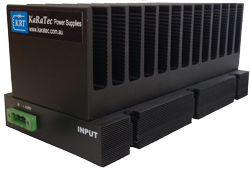Converters are electronic circuits that initiate high-level voltage conversions for smooth functioning of various electrical components thus ensuring the optimum performance of the electronic device concerned. They have large-scale applications ranging from portable electronic devices to heavy-duty industrial machineries with kilowatts worth of power requirements. Let us dive deeper into this by understanding how a converter actually works and what the various types of converters in play are today. We will cover traditional converters as well as their industrial counterparts, the rugged dc dc converter in order to gain the best possible understanding of this domain.

The various types of converters in play today ranges in categories and sub-categories that will make any simple individual a confused physicist. Thus, to save our readers from such a plight we need to address only the ones concerned with the topic that we the discussing today. Converters, especially the ones converting direct current to a higher voltage of the same type is an integral part for hassle-free functioning of various electronic components. Therefore, converters are generally categorized into two primary forms: ac-to-dc converter and dc-to-dc converter. A dc-to-dc converter categorized into two types:
- Step-up: In this type of converters, the output voltage is higher than then the input voltage.
- Step-down: In this type, the input voltage is higher compared to the output.
We are going to further categorize and discuss the dc-to-dc converter in details. A dc-to-dc converter primarily follows three specific methods for conversion:
- Electro-mechanical Method: a motor generator does this type of conversion methodology where a motor and a generator is coupled to undertake the procedure.
- Electronic Conversion: This type of converter uses the switching technique where a switched-mode dc-to-dc converter converts one voltage to another. It temporarily stores an input energy and then releases that energy at a different level.
- Electro-chemical Conversion: This type of conversion is utilized when the conversion requires taking place in the kilowatts to mega-watts range. It uses high-grade redox batteries initiating a complex chemical process to accomplish the same.
Now the dc-to-dc converters has a much more durable and resistant industrial counterpart known as the rugged dc dc converters. Let us understand their key specialty and know why they are preferred over their simpler cousins. The rugged version of a dc-to-dc converter features an industrial-grade, durable and high resistant encasing that helps it achieve efficiency in conditions that include extreme temperatures and hostile conditions. It has a high range of operation in terms of voltage levels and is often put into use to operate complex, heavy-duty machinery.
Due to their complex functioning requirements, the rugged versions of dc-to-dc converters are often custom built. Therefore, they are often offered as custom made power solutions across industries to streamline and ease their functioning. They are used in a wide array of business applications enabling them to maintain flexibility and adapt with the fast changing business dynamics. Hence, they evolve with their application and become more complex and robust to adapt accordingly.